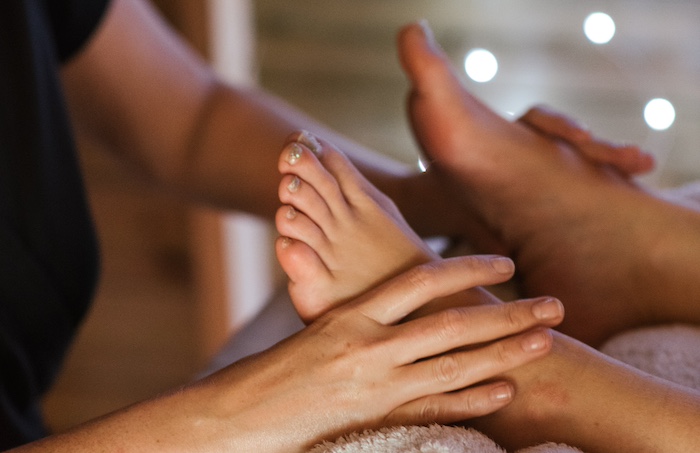
With people relying on their feet a lot more daily, knowing how to care for them properly is important. Here are 5 tips to help you do just that.
You may find yourself relying on your feet – whether it’s for the mental or physical benefits of running and walking or just to get where you’re going. But how do you care for those feet, now that they’re getting a lot more use than they may be accustomed to?
Don't Wear Old Shoes Or Shoes That Don't Fit
They may feel comfortable, but old shoes are a major cause of foot overuse injuries. If sneakers are worn down, they’re less efficient at absorbing shock, which is the main function of the heel and the foot.
Also, don’t wear flat styles, which cause extra stress on the heels, Achilles tendons, calves, shins, and knees and can lead to discomfort and inflammation. A small heel is better than a flat shoe because it gives more stability and reduces the force on the foot, ankle, and lower leg.
To get the best fit for new shoes, try them on in the afternoon, when your foot is swollen to its largest point, to get a more accurate idea of how comfortable it is. There is no such thing as “breaking in” a shoe – it either fits or it doesn’t. Trying to fit a size 9 foot into a size 7 shoe can damage the 26 bones, 29 muscles, and more than 100 tendons and ligaments you’re squishing together to squeeze them on. Avoid buying shoes online unless you’ve bought the same shoe in the past and you know it works for you.
Do Wear Shoes At Home
Going barefoot around your house may seem logical, but it could put unnecessary strain on your feet. Your arches need support — without it, the rest of your foot works overtime. This can lead to fatigue and can also increase the stress on your knees, hips, and lower back. A supportive slipper, with a firm backing and a supportive midsole, can be a good option if you don’t want to wear shoes inside.
Don't Sit For Too Long
Even if you’re walking less than you used to because you’re home more often, you should still keep your foot health in mind, since a lack of activity can equally affect them. Sitting for prolonged periods causes the Achilles tendon and plantar fascia that runs underneath the bottom of the foot to shorten. This puts added stress and tension on the foot, ankle, and lower leg.
Before you get out of bed in the morning, try stretching your Achilles tendons, which are in the back of your heel. It’s a good warmup for your heel and your plantar fascia, which is a thick band of tissue that runs along the underside of each foot.
Do Soak Your Feet
After walking around all day, your feet may swell or feel tired. To reduce swelling and inflammation, soak your feet in a cold bathtub twice a day for 20 minutes. (Hot water adds to the swelling and makes discomfort worse.) You can also reduce swelling by raising your feet 6 inches above your heart at night while you sleep.
Don't Ignore Swelling Or Pain
And finally, don’t ignore constant swelling in the feet and ankles as this may also signal a problem with circulation or blood flow to the foot. If you have type 2 diabetes, you are more prone to these injuries, as this condition predisposes you to have delayed healing and recovery issues.
Precision Pain Care and Rehabilitation has two convenient locations in Richmond Hill – Queens, and New Hyde Park – Long Island. Call the Queens office at (718) 215-1888 or (516) 419-4480 for the Long Island office to arrange an appointment with our Interventional Pain Management Specialists, Dr. Jeffrey Chacko or Dr. Sonny Ahluwalia.













